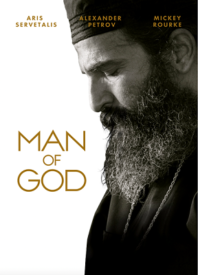
Nektarios (Aris Servetalis) is a Greek priest in Alexandria, Egypt during the 1900s. Today, about a century after his death, he receives adoration from Greek people both within and outside those borders. He’s a relatively obscure figure outside of that community though. And to spread the awareness about him, a Greek Christian studio greenlit a biographical drama about him. They entitle this film Man of God and hired Yelena Popovic as a director, producer and writer. Popova’s other directing credits is about a Greek immigrant to LA who wants to be a rock star. Other than the cynical reasons for making a Christian film, it makes sense that Popovic can relate to this outsider. A review about this can have different angles. One is that this is different from the other examples of evangelical cinema of the past two decades.
The more obvious angle is whether or not Nektarios and the characters around him are human enough to make this film good. Man of God at least organizes itself into four acts instead of three. And the structure and lengths of these acts are unconventional in comparison the low bar of expectations that I set this film with. The first three are short. The first shows Nektarios leaving the intrigue in Egypt which, by the way, credits to this movie for showing the Blackest depiction of Egypt in my cinematic memory. The second has him getting an assignment in an island with male Greek citizens who hate priests. And the third is when he manages a school, where he works under a hot president Christos (Christos Loulis).
The movie reveals that Christos is only giving Nektarios a hard time because he’s a sad atheist. The fourth and longest act is when Nektarios manages convent. Nektarios’ iffy status as a Greek citizen occasionally comes up. But that’s one of Man of God‘s possible ins as a window into Greece as both a young country and a home to one of Christianity’s oldest sects. It also is a possible way of showing Nektarios’ pathos, which in fairness it shows occasionally. But those moments are too few and far between. And instead the movie decides to show him as someone who is ultra pious in a way that doesn’t come off as believable. The movie can at least address why he is the most qualified person to run a convent which raises eyebrows then and now. My eyebrows raise because it uses the darkest cinematography in depicting Mediterranean locales.
Those eyebrows, by the way, come from cops which good for this Christian movie to also say ACAB. Nonetheless, there are a lot of things that are lacking in this movie. As I wrote in the previous paragraph, these characters are two dimensional. This lack of dimension comes out through both the acting and the dialogue. The dialogue is more to blame for this, because there’s at least one actor per country who can pull of the kinds of things that saintly figures usually say. I did some research on this and apparently, half of Greek people can converse in English. Still, Servetalis and his costars like Alexander Petrov a hard time imbuing complex ideas in paper thin dialogue in a second language and it shows. Lastly, Mickey Rourke shows up for two minutes in a useless scene.
- Release Date: 7/26/2022

